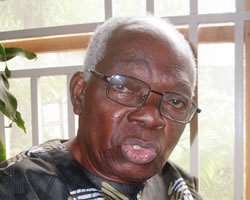Computer Science borrowed from Ifa Corpus-Longe ----Professor Olu Longe

Professor Olu Longe is a renowned Professor of Computer Science from the University of Ibadan. His researches have contributed to the Yoruba numerical system which Orunmila introduced over 1,000 years ago. KEHINDE OYETIMI provides excerpts of an interaction with him.
WHAT provided the impetus for writing two books on the numerical system of the Yoruba language?
The impetus is that the Yoruba number system is difficult to use and many educated Yoruba people are not using the numbers anymore. We are in danger of losing a very important aspect of our culture. You must be a graduate.
I am sir.
What did you study at the university?
I hold a B.A. in English.
Let me ask you this. What is the Yoruba equivalent of 346?
I have no idea sir.
Just imagine that. You are a university graduate. If you want to do some arithmetic in Yoruba language, you won't be able to do it. This is because many of us do not know the numbers. That is the motivation for writing the books.
What were the major challenges that you faced while computing them?
It was not about challenges; it was just that I was worried about the situation. I decided to look at the existing number system that we are using in Yoruba today. One of the problems is that it is a very old system. The system was introduced by Orunmila more than 1,000 years ago. When he introduced it, it was revolutionary. It was very good;
it was very useful for the civilisation of that time. He introduced a very simple tool which people could use for counting. The tools are the fingers of the hands and the toes of the feet. There are ten fingers and ten toes, making a total of twenty. He based the system on twenty. That's why you have 20 which is ogun. We have ogoji, ogota, ogorin, ogosan and 200, 2000 and so on. It is a number which is based on 20. That's why it is called a vigesimal number system.
As I said, it was useful at the time it was introduced. It was quite simple. In fact, the biggest number that had a unique name in that system is 20,000 which is called oke kan. The currency that was in use at that time was the cowry. Anybody who had 20,000 cowries was a millionaire then. You had to have a big sack to carry 20,000 cowries. Nobody was able to count beyond 20,000. So these are some of the limitations of the system. That is what we are facing today. Therefore we needed to look at it. In these days, we count millions, billions, trillions. In Yoruba, there are no equivalents of those big numbers.
What should be done about that?
I did a research. It is better for us to get a modern number system. One of the issues is that many nations of the world today base their number system on ten. I decided that I was going to introduce a Yoruba number system that is based on ten not 20 as Orunmila did. I had to get the basic names of the basic integers.
Those would be numbers from zero to ten. I decided to use the existing names of those numbers: okan, ogini, eji, eta, erin, arun, eje, ejo, esan, ewa. One of the difficulties in the old system is the use of subtraction in getting the names of numbers in that vigesimal number system. For instance, 27 is called etadinlogbon.
This means you have to subtract three from 30 to get 27. Another difficulty is that they give names of numbers from right to left. When I say 27, they start with seven and go on to 20. This is contrary to the modern number system in other countries of the world. I decided that we are not going to use subtraction. I got the multiples of 10 and gave them new names. 20 is ejiwa which is 2X10. 30 is etawa; 40 is erinwa and all that.
As a computer scientist, we know the Chinese and Japanese have introduced computer keyboards in their languages. What is being done to ensure the spread of the use of the computer keyboards that are written in Yoruba?
There is a keyboard already in Yoruba language. For people who know about it, they use it. I have one in my house. It is called Kanyi.
Is the ministry of education not going to circulate the use of this in schools so as to facilitate the usage in the modern study of Yoruba language?
That is where you come in. We need to introduce this and the outcome of my research study to all schools in the country so that we would be able to count in our language and begin to do arithmetic in our own language. We need to do marketing and banking in our own languages. We are not doing that now. If you go to any bank, they would not be talking to you in Yoruba. We need to introduce the system to several aspects of our lives.
It may be surprising but computer science borrowed from Ifa divination system. We saw that many of the things that were introduced in 1963 in computer science had been in Ifa divination for more than 1,000 years ago.
